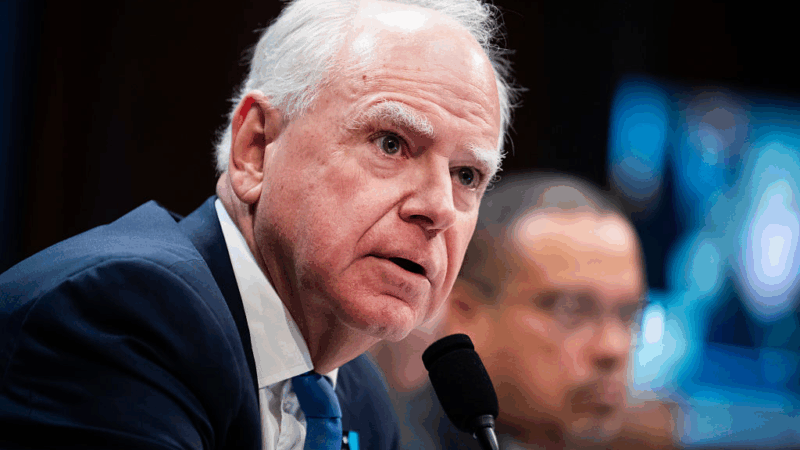Supreme Court limits environmental reviews of infrastructure projects
The U.S. Supreme Court sharply narrowed the scope of a key environmental statute on Thursday. The decision makes it easier to win approval for highways, bridges, pipelines, wind farms and other infrastructure projects.
The National Environmental Policy Act is considered the nation’s premier environmental law because it sets up a regulatory regime under which the federal government seeks information from a wide array of agencies about the impact of proposed infrastructure projects before they’re built.
At issue in Thursday’s case was the proposed building of an 88-mile stretch of railroad that would connect Utah’s oil-rich Uinta Basin to the national freight rail network. Once built, the new rail lines would facilitate the transportation of crude oil to refineries in Texas and Louisiana along the Gulf Coast.
In carrying out the review, the U.S. Surface Transportation Board sought input from other agencies, prepared a 3,600-page report and approved the railroad project, after concluding that its transportation and economic benefits outweighed the negative impact on the environment. The U.S. Court of Appeals in Washington subsequently ruled that the Board had violated NEPA, by failing to consider the environmental effects from oil drilling and production, referred to as upstream, and oil refining and distribution, known as downstream.
The Supreme Court, however, reversed that ruling, and in so doing dramatically limited the 1970 law. The vote was unanimous, though Justice Neil Gorsuch did not take part in deliberations, and the court’s three liberals wrote a more limited concurring opinion. The Court’s conservatives, however, took a major whack at the NEPA law.
“They did a major cutback,” said Harvard Law Professor Richard Lazarus, who has written extensively about NEPA. Essentially, he said, the court had created a new categorical rule barring any consideration of the upstream and downstream effects of such projects. “Right or wrong, that’s not been the NEPA law for 50 years,” said Lazarus.
Writing for the court majority, Justice Brett Kavanaugh said that courts should defer to agency determinations about where to draw the line when considering environmental effects, as long as agency choices “fall within a broad zone of reasonableness.”
Kavanaugh distinguished NEPA from other environmental laws, arguing that it’s “purely a procedural statute” that is not meant to be “a roadblock.” He framed his opinion as a “judicial correction,” pointing to “delay after delay” on multiple projects, which he maintained sometimes “bordered on the Kafkaesque.”
Lazarus said Kavanaugh’s opinion reads less like a judicial correction and more like a legislative policy initiative. “He goes on this tirade where he talks about how awful NEPA has been and how it stopped all these things, how it costs jobs. And there’s no citation [to any factual findings]. He’s made it up,” said Lazarus. “It’s a complete policy argument.”
At the same time, though, Lazarus conceded that over the years there has been consistent pushback against NEPA both in the courts and in Congress. He noted, for instance, that Congress, in 2023, during the Biden administration, took steps to limit some of the NEPA review.
What’s more, some environmental groups have also endorsed speeding up the process, including, as Lazarus observes, “national groups who want those transmission grids built, and those windmills up, and those solar panel huge facilities built. So NEPA has created that tension.”
But many environmental groups were dismayed by Thursday’s decision. Earthjustice called the decision an invitation to the Trump administration to “ignore environmental concerns as it tries to promote fossil fuels, kill off renewable energy, and destroy sensible pollution requirements.”
Conversely, a large array of mining, oil, lumber, real estate and other interests were thrilled by the court’s decision.
“In recent years, courts have gone farther and farther afield in demanding agencies speculate on downstream impacts over which the agencies have no control and that are beyond their regulatory authority,” said lawyer Hadassah Reimer, who filed a friend of the court brief on behalf of these interest groups. She said the decision “will promote more efficient and effective NEPA review for countless projects across the country.”
U.S-Israeli strikes continue across Iran, Iranian drones hit Azerbaijan
The U.S. and Israel said they conducted new strikes inside Iran overnight, targeting ballistic missile launchers. Iran claimed it struck a U.S. oil tanker in the northern Persian Gulf.
In lawsuit, Minnesota accuses Trump administration of ‘weaponizing’ Medicaid funding
The federal government said the state should do more to fight fraud and is holding back funds. Minnesota officials say the attack is unfair as the state's fraud rate is well below national averages.
Wall Street is betting on tariff refunds after Supreme Court ruling
When the Supreme Court struck down many of President Trump's tariffs, it left importers wondering how long they'd have to wait to get their money back. Hedge funds are offering to help out.
Announcing the 2025 NPR College Podcast Challenge Honorable Mentions
Here are some of the best entries in NPR's 2025 College Podcast Challenge.
A run for their money: Young candidates rival older incumbents in midterm fundraising
As a growing crop of young candidates challenge longtime Democratic incumbents, some are not just breaking through in the money race, but outraising their opponents altogether.
When ICE came, Minneapolis created underground health networks. Should other cities?
The Trump administration's immigration crackdown in Minneapolis forced some families into hiding and catalyzed informal medical networks to deliver critical health care services inside homes.







